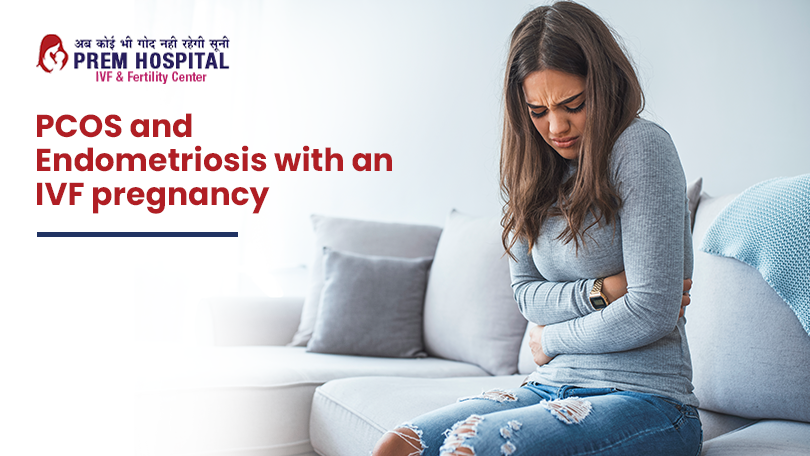A person’s journey toward conception may be greatly impacted by two complicated reproductive medical conditions: endometriosis and polycystic ovarian syndrome (PCOS). The road to parenting can be rough for those who are having trouble getting pregnant because of PCOS or endometriosis. But for those dealing with these illnesses, new developments in assisted reproductive technologies—especially pregnancy treatment IVF (in vitro fertilization)—offer hope.
Understanding PCOS and Endometriosis
PCOS: The Hormonal Imbalance
Hormonal abnormalities, irregular menstruation periods, and ovarian cysts are the hallmarks of polycystic ovary syndrome. Approximately one in ten women who are of childbearing age suffer from this illness. Females with PCOS frequently experience difficulties associated with ovulation, making fertilization troublesome. Furthermore, elevated levels of androgens, like testosterone, can obstruct the systematic arrival of ovarian eggs.
Endometriosis: The Invisible Pain
Endometriosis happens when tissue alike the border of the uterus develops on the surface of the uterus, usually on the pelvic tissues, fallopian tubes, and pelvic tissues. This state of condition influences around one out of ten females of regenerative age. The existence of endometrial tissue at the border of the uterus can cause irritation, scarring, and grips, prompting pelvic agony, excruciating periods, and failure to achieve pregnancy. Endometriosis can likewise influence the quality of the egg and can interrupt the typical capability of the regenerative organs.
The Role of IVF in Overcoming Challenges
Understanding In Vitro Fertilization (IVF)
The process of retrieving eggs out of ovaries, infusing them using sperm in a lab, and then putting the embryos that arise into the uterus is known as in vitro fertilization. For those who are unable to conceive naturally due to endometriosis or PCOS, in vitro fertilization (IVF) provides a feasible solution.
Addressing PCOS Challenges with IVF
IVF stimulates the ovaries to generate numerous eggs, which helps correct the abnormalities in ovulation linked to PCOS. Induced-regulated ovulation and hormone regulation are two benefits of medications employed in IVF protocols that improve the likelihood of successful retrieval of eggs and embryo growth.
Tackling Endometriosis-related Obstacles
IVF treatment for pregnancy offers a means of achieving conception for endometriosis patients by removing the barriers of scar tissue, pelvic adhesions & low-quality eggs. By recovering eggs straightforwardly from the ovaries and moving incipient organisms into the uterus, IVF dodges the difficulties of normal origination impacted by endometrial inserts and irritation.
Navigating the IVF journey with PCOS and Endometriosis
Preparation and Planning
Prior to going for IVF, people having endometriosis or PCOS go through comprehensive assessments and meetings with fertility specialist doctor. These specialists can recommend ovarian reserve testing, and hormonal evaluations, and may discuss treatment choices customized to their particular requirements.
Ovarian Stimulation and Egg Retrieval
In IVF treatment, ovarian stimulation is done with fertility medicines to stimulate the ovaries to create different eggs. Ultrasound and hormone levels are carefully monitored to ensure optimal follicular growth. During the retrieval of eggs, mature eggs are collected from the ovaries under sedation in a minimally invasive process.
Fertilization and Embryo Development
After retrieved oocytes are pollinated with gametes in a lab, the resulting embryos are cultivated, and their quality and development are closely observed. To evaluate embryo viability and check for chromosomal abnormalities, advanced techniques like preimplantation genetic testing (PGT) may be used. This is especially advantageous for people who have underlying fertility problems.
Embryo Transfer and Implantation
Advanced approaches, for example, preimplantation genetic testing (PGT) can be used to assess embryo viability and screen for chromosomal abnormalities. This is particularly beneficial for people with basic fertility issues. Strategically selecting the highest quality embryos maximizes the chances of successful implantation and pregnancy.
Challenges and Considerations
Managing Expectations
While IVF has promising results for many people with endometriosis and PCOS, it’s important to approach the process with realistic expectations. Success rates differ depending on factors such as age, ovarian reserve, and seriousness of underlying disease. Open communication with your healthcare providers and continued support from your loved ones will reduce fear and uncertainty along the way.
Emotional Resilience
The IVF process brings up a variety of emotions, from hopes and expectations to stress and disappointment. Coping arrangements such as awareness, journaling, and seeking professional corporate counseling can help people control their emotions. Communication with self-help groups and online communities also provides valuable support and solidarity among peers.
Health and Wellness
It’s important to prioritize self-care and overall health throughout the IVF process. By adopting a healthy lifestyle, including a nutritious diet, daily exercise, and stress-releasing activities, you can optimize your fertility results and overall health. Mind-body exercises such as meditation, yoga, and acupuncture have additional advantages in promoting balance and hormonal balance.
Conclusion
Managing an IVF pregnancy with endometriosis and PCOS demands, courage and even determination. Regardless of the challenges, IVF offers a glimmer of hope for people eager to get pregnant and start or grow a family. By working with a knowledgeable IVF center in Meerut, leveraging a support network, and prioritizing physical and mental health, individuals can begin their IVF journey with confidence and optimism. It can pave the way for you to realize your dream of becoming a parent.

